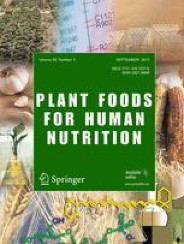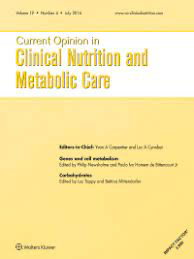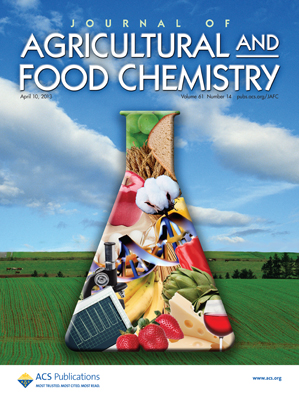Watermelon
How to submit an article:
- Registered users can submit any published journal article that has a unique DOI (Digital Object Identifier) name or link to Research Hub.
- For example, you can paste the full DOI link:
https://doi.org/10.1109/5.771073or just the DOI name:10.1109/5.771073into the field above and click submit. - The person who is first to submit a valid article to Research Hub will forever be credited for it, and every article submission earns you +6 Research Points.
Related Topics
Published research studies are articles that present the findings of original research that has undergone a peer-review process and has been made publicly available in scholarly journals, books or other media.

Watermelon Juice: a Novel Functional Food to Increase Circulating Lycopene in Older Adult Women
2019 Jun 15 Plant Foods for Human Nutrition Ellis, A.C., Dudenbostel, T. & Crowe-White, K
WatermelonResults demonstrate that 100% watermelon juice is a palatable, effective means of increasing serum lycopene in older adult women, a group at risk for low carotenoid intake.

Effects of L-citrulline supplementation on blood pressure: A systematic review and meta-analysis
2019 Jan Avicenna Journal of Phytomedicine Barkhidarian B, Khorshidi M, Shab-Bidar S, Hashemi B.
Systematic Review Meta-AnalysisL-citrulline supplementation may reduce systolic blood pressure. A significant reduction in diastolic blood pressure was observed only in the studies that used doses ≥ 6 g/day.

Influence of L-citrulline and watermelon supplementation on vascular function and exercise performance
2017 Jan Current Opinion in Clinical Nutrition and Metabolic Care Figueroa A, Wong A, Jaime SJ, Gonzales JU.
Review ArticleRecent studies have shown that chronic L-citrulline supplementation increases nitric oxide synthesis, decreases blood pressure, and may increase peripheral blood flow.

Watermelon juice: potential functional drink for sore muscle relief in athletes
2013 Jul 29 Journal of Agricultural and Food Chemistry Tarazona-Díaz MP, Alacid F, Carrasco M, Martínez I, Aguayo E.
Clinical StudyWatermelon juice helped to reduce the recovery heart rate and muscle soreness after 24 h in seven athletes.
Research insights are moderated by the Research Hub team and offer an at-a-glance overview of interesting research findings.

2019 Plant Foods for Human Nutrition
Results demonstrate that 100% watermelon juice is a palatable, effective means of increasing serum lycopene in older adult women, a group at risk for low carotenoid intake.
Watermelon Juice: a Novel Functional Food to Increase Circulating Lycopene in Older Adult Women
Ellis, A.C., Dudenbostel, T. & Crowe-White, K

2019 Avicenna Journal of Phytomedicine
L-citrulline supplementation may reduce systolic blood pressure. A significant reduction in diastolic blood pressure was observed only in the studies that used doses ≥ 6 g/day.
Systematic Review
Effects of L-citrulline supplementation on blood pressure: A systematic review and meta-analysis
Barkhidarian B, Khorshidi M, Shab-Bidar S, Hashemi B.

2017 Current Opinion in Clinical Nutrition and Metabolic Care
Recent studies have shown that chronic L-citrulline supplementation increases nitric oxide synthesis, decreases blood pressure, and may increase peripheral blood flow.
Review Article
Influence of L-citrulline and watermelon supplementation on vascular function and exercise performance
Figueroa A, Wong A, Jaime SJ, Gonzales JU.

2013 Journal of Agricultural and Food Chemistry
Watermelon juice helped to reduce the recovery heart rate and muscle soreness after 24 h in seven athletes.
Clinical Study
Watermelon juice: potential functional drink for sore muscle relief in athletes
Tarazona-Díaz MP, Alacid F, Carrasco M, Martínez I, Aguayo E.
Review Articles
Review articles summarise and critically evaluate the current state of research on a specific topic or field by synthesising multiple primary research studies.

Effects of L-citrulline supplementation on blood pressure: A systematic review and meta-analysis
2019 Jan Avicenna Journal of Phytomedicine Barkhidarian B, Khorshidi M, Shab-Bidar S, Hashemi B.
Systematic Review Meta-AnalysisL-citrulline supplementation may reduce systolic blood pressure. A significant reduction in diastolic blood pressure was observed only in the studies that used doses ≥ 6 g/day.

Influence of L-citrulline and watermelon supplementation on vascular function and exercise performance
2017 Jan Current Opinion in Clinical Nutrition and Metabolic Care Figueroa A, Wong A, Jaime SJ, Gonzales JU.
Review ArticleRecent studies have shown that chronic L-citrulline supplementation increases nitric oxide synthesis, decreases blood pressure, and may increase peripheral blood flow.
Clinical Trials
Clinical trials are research studies that involve people and are conducted to evaluate the safety and efficacy of new treatments or interventions, such as drugs, medical devices, or behavioural therapies.
Study Protocols
Published study protocols are detailed plans that outline the objectives, methodology, statistical analyses, and organisation of a research study that have been made publicly available for others to review and use as a reference.
Presentation Slides

Results demonstrate that 100% watermelon juice is a palatable, effective means of increasing serum lycopene in older adult women, a group at risk for low carotenoid intake.
Ellis, A.C., Dudenbostel, T. & Crowe-White, K

Systematic Review
L-citrulline supplementation may reduce systolic blood pressure. A significant reduction in diastolic blood pressure was observed only in the studies that used doses ≥ 6 g/day.
Barkhidarian B, Khorshidi M, Shab-Bidar S, Hashemi B.

Review Article
Recent studies have shown that chronic L-citrulline supplementation increases nitric oxide synthesis, decreases blood pressure, and may increase peripheral blood flow.
Figueroa A, Wong A, Jaime SJ, Gonzales JU.

Clinical Study
Watermelon juice helped to reduce the recovery heart rate and muscle soreness after 24 h in seven athletes.
Tarazona-Díaz MP, Alacid F, Carrasco M, Martínez I, Aguayo E.
Executive Summary
Write an executive summary in the form of a blog article on the topic of "Research into Chinese medicine treatment for Watermelon" summarising the research below and using language that can be easily understood by patients and avoiding medical jargon using a professional and caring tone of voice.
Write an executive summary in the form of a blog article on the topic of "Researched Chinese medicine treatments for Watermelon" summarising the research below in an objective and easy to understand way, and using language that can be easily understood by patients. Group the article into Chinese medicine treatments first, followed by nutrition and other treatments. Avoid using medical jargon and use a professional and caring tone of voice.
Write me a concise but easy to understand executive summary on the topic of "Chinese medicine treatments for Watermelon" based on the following research that I will give you. Your summary should be 2 paragraphs long in Australian English spelling and include references to the studies.
A published in 2019 in the journal Plant Foods for Human Nutrition found that Results demonstrate that 100% watermelon juice is a palatable, effective means of increasing serum lycopene in older adult women, a group at risk for low carotenoid intake. Watermelon is one of the few food sources of dietary lycopene. Because heat treatment increases lycopene bioavailability, ingestion of watermelon in pasteurized juice form may be an optimal delivery vehicle to increase lycopene levels in older adults. However, due to its lipophilic nature, there are concerns that co-ingestion of dietary fat may be necessary for efficient intestinal absorption of lycopene. Thus, this feasibility study aimed to examine the effects of a one-time dose of 100% pasteurized watermelon juice on circulating lycopene concentrations of postmenopausal women after a 10-h overnight fast. Blood was sampled from eight women before and 2 h after ingestion of 360 ml of juice, and serum lycopene was measured by ultra-high performance liquid chromatography. Circulating lycopene levels increased by three-fold (p < 0.001) with increases observed for every participant.
A Systematic Review published in 2019 in the journal Avicenna Journal of Phytomedicine found that L-citrulline supplementation may reduce systolic blood pressure. A significant reduction in diastolic blood pressure was observed only in the studies that used doses ≥ 6 g/day. The included studies' sample size ranged between 12 and 34 subjects. The mean age of the participants in these trials ranged between 22 and 71 years. Dosage of L-citrulline supplementation varied from 3 to 9 g/day. Duration of the intervention ranged between 1 and 17 weeks. The pooled changes in systolic and diastolic BP were (MD, −4.10 mm Hg; 95% CI [−7.94, -0.26]; p=0.037) and (MD −2.08 mm Hg; 95% CI [−4.32, 0.16]; P=0.069), respectively. The subgroup analysis showed a significant diastolic BP reduction in studies that used doses of ≥6 g/day (MD −2.75 mm Hg; 95% CI [−5.37, -0.12]; p=0.04).
A Review Article published in 2017 in the journal Current Opinion in Clinical Nutrition and Metabolic Care found that Recent studies have shown that chronic L-citrulline supplementation increases nitric oxide synthesis, decreases blood pressure, and may increase peripheral blood flow. L-Citrulline, either synthetic or in watermelon, may improve vascular function through increased L-arginine bioavailability and nitric oxide synthesis. There is clear evidence that acute L-citrulline ingestion increases plasma L-arginine, the substrate for endothelial nitric oxide synthesis. However, the subsequent acute improvement in nitric oxide production and mediated vasodilation is inconsistent, which likely explains the inability of acute L-citrulline or watermelon to improve exercise tolerance. Recent studies have shown that chronic L-citrulline supplementation increases nitric oxide synthesis, decreases blood pressure, and may increase peripheral blood flow. These changes are paralleled by improvements in skeletal muscle oxygenation and performance during endurance exercise. The antihypertensive effect of L-citrulline/watermelon supplementation is evident in adults with prehypertension or hypertension, but not in normotensives. However, L-citrulline supplementation may attenuate the blood pressure response to exercise in normotensive men. The beneficial vascular effects of L-citrulline/watermelon supplementation may stem from improvements in the L-arginine/nitric oxide pathway. Reductions in resting blood pressure with L-citrulline/watermelon supplementation may have major implications for individuals with prehypertension and hypertension. L-Citrulline supplementation, but not acute ingestion, have shown to improve exercise performance in young healthy adults.
A Clinical Study published in 2013 in the journal Journal of Agricultural and Food Chemistry found that Watermelon juice helped to reduce the recovery heart rate and muscle soreness after 24 h in seven athletes. In the in vivo experiment (maximum effort test in a cycloergometer), seven athletes were supplied with 500 mL of natural watermelon juice (1.17 g of l-citrulline), enriched watermelon juice (4.83 g of l-citrulline plus 1.17 g from watermelon), and placebo. Both watermelon juices helped to reduce the recovery heart rate and muscle soreness after 24 h.
Moderation Tools
Topic
Sign In
Users not signed in are limited to viewing the 5 most recent items of content.
Lycopene may improve vascular function and contributes to the primary and secondary prevention of cardiovascular disorders. The main activity profile of lycopene includes antiatherosclerotic, antioxidant, anti-inflammatory, antihypertensive, antiplatelet, anti-apoptotic, and protective endothelial effects, the ability to improve the metabolic profile, and reduce arterial stiffness. In this context, lycopene has been shown in numerous studies to exert a favorable effect in patients with subclinical atherosclerosis, metabolic syndrome, hypertension, peripheral vascular disease, stroke and several other cardiovascular disorders, although the obtained results are sometimes inconsistent, which warrants further studies focusing on its bioactivity. https://doi.org/10.3389/fphar.2018.00521 —Jinnan C 30 Aug 2021
Where do you we find pastrurised watermelon???? — 26 Aug 2021